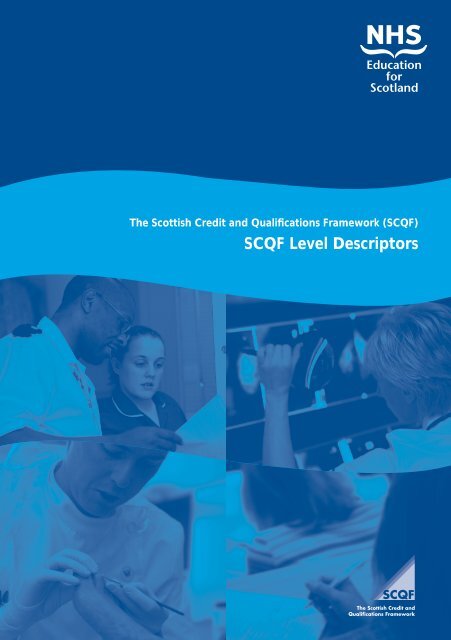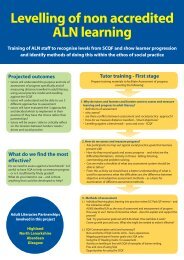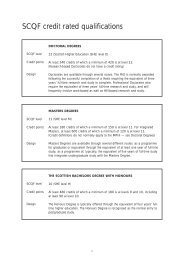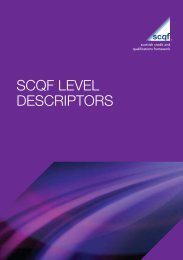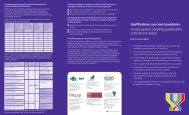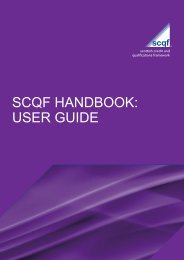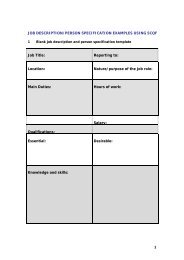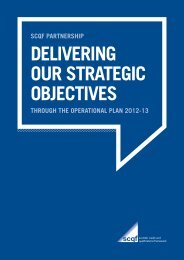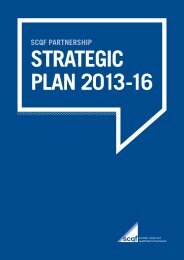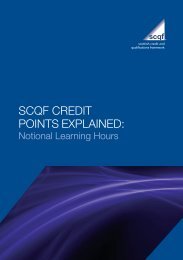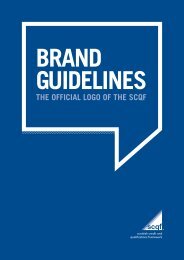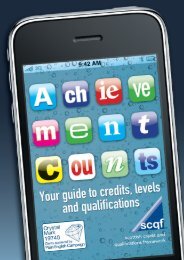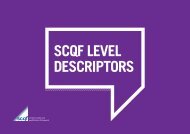SCQF Level Descriptors - Scottish Credit and Qualifications ...
SCQF Level Descriptors - Scottish Credit and Qualifications ...
SCQF Level Descriptors - Scottish Credit and Qualifications ...
You also want an ePaper? Increase the reach of your titles
YUMPU automatically turns print PDFs into web optimized ePapers that Google loves.
The <strong>Scottish</strong> <strong>Credit</strong> <strong>and</strong> <strong>Qualifications</strong> Framework (<strong>SCQF</strong>)<br />
<strong>SCQF</strong> <strong>Level</strong> <strong>Descriptors</strong>
<strong>SCQF</strong> <strong>Level</strong> <strong>Descriptors</strong><br />
The <strong>Scottish</strong> <strong>Credit</strong> & <strong>Qualifications</strong> Framework<br />
The <strong>SCQF</strong> provides a national vocabulary for describing learning<br />
opportunities so making the relationships between qualifications clearer.<br />
It will clarify entry <strong>and</strong> exit points, help map routes for progression within <strong>and</strong><br />
across education <strong>and</strong> training sectors <strong>and</strong> increase the opportunities for<br />
credit transfer. In these ways it will assist learners to plan their progress <strong>and</strong><br />
minimise duplication of learning.<br />
1
<strong>SCQF</strong> <strong>Level</strong> <strong>Descriptors</strong><br />
The level descriptors<br />
The <strong>SCQF</strong> has 12 levels reflecting the current <strong>Scottish</strong> system of education<br />
<strong>and</strong> training. There are no descriptors for level 1 which covers all provision<br />
which falls below the full achievement of level 2 while level 12 relates to<br />
outcomes associated with doctoral level studies. The descriptors show how<br />
each level becomes increasingly dem<strong>and</strong>ing by changes to factors such as<br />
complexity <strong>and</strong> depth of knowledge, links to associated academic,<br />
vocational or professional practice, <strong>and</strong> the degree of autonomy exercised<br />
by the learner.<br />
<strong>SCQF</strong> levels provide a basis for broad comparisons between learning <strong>and</strong><br />
qualifications achieved in different contexts, such as the workplace <strong>and</strong><br />
formal classroom study, <strong>and</strong> by a variety of modes, but they can only be<br />
applied to learning which has been or can be subject to valid, reliable <strong>and</strong><br />
quality assured assessment.<br />
These generic level descriptors have been designed to provide a general<br />
underst<strong>and</strong>ing of each level. The descriptors give broad, general, but<br />
meaningful, indicators of the characteristics of learning at each level. They<br />
are not intended to give precise or comprehensive statements of required<br />
learning at each level.<br />
The descriptors can be used in a number of ways:<br />
• to allocate levels to learning programmes <strong>and</strong> qualifications<br />
• in validation events for qualifications <strong>and</strong> programmes<br />
as a basis for communication with learners <strong>and</strong> other users of<br />
qualifications<br />
• as a guide for mapping progression routes within <strong>and</strong> across the<br />
education <strong>and</strong> training sectors<br />
• by programme designers when making entry requirements <strong>and</strong><br />
recommendations for programmes<br />
At each level five headings have been identified to make the descriptors<br />
manageable. These are:<br />
• knowledge <strong>and</strong> underst<strong>and</strong>ing — mainly subject-based<br />
• practice: applied knowledge <strong>and</strong> underst<strong>and</strong>ing<br />
• generic cognitive skills, eg evaluation, critical analysis<br />
• communication, numeracy <strong>and</strong> IT skills<br />
• autonomy, accountability <strong>and</strong> working with others<br />
2
<strong>SCQF</strong> <strong>Level</strong> <strong>Descriptors</strong><br />
There is no separate descriptor for level 1, which covers all provision that<br />
comes below the full achievement of level 2.<br />
Where two or more qualifications or programmes of learning are placed at<br />
the same level they will be comparable in certain respects, particularly their<br />
overall level of outcome, but they will each have their own purpose, content<br />
or structure. The <strong>SCQF</strong> does not, however, demonstrate equivalence or<br />
inter-changeability of qualifications.<br />
Using the level descriptors<br />
The descriptors flesh out the levels of the Framework. They are designed<br />
to help programme designers <strong>and</strong> the writers of Unit specifications to look<br />
at the range of skills that might be covered at a particular level, select<br />
appropriate headings <strong>and</strong> peg outcomes accordingly.<br />
It is envisaged that people assigning a level to a qualification will employ an<br />
approach that involves both matching against a level <strong>and</strong> identifying the<br />
levels above <strong>and</strong> below which don’t match. This will be done by direct<br />
matching with the descriptors, <strong>and</strong> by making comparisons with the SQA<br />
<strong>and</strong> HEI qualifications that make up the Framework.<br />
It is not envisaged that a learner in every unit/course/programme will cover<br />
all of the headings. The decision regarding what is included lies with the<br />
designers/writers of programmes of learning. However, it is envisaged that<br />
Knowledge <strong>and</strong> Underst<strong>and</strong>ing <strong>and</strong>/or Practice - applied knowledge <strong>and</strong><br />
underst<strong>and</strong>ing will be a key to allocating a level to most programmes.<br />
<strong>Level</strong> descriptors can be used at any stage in the design, development <strong>and</strong><br />
validation of programmes, courses or units. The intention is for them to be<br />
used as a guide to locate the level of outcomes, but not to prescribe the<br />
content, range, <strong>and</strong> so on. They are not intended to be the sole reference<br />
source either.<br />
NB These descriptors set out the characteristic generic outcomes of each<br />
level. They are intended to provide a general, shared underst<strong>and</strong>ing of<br />
each level <strong>and</strong> to allow broad comparisons to be made between<br />
qualifications <strong>and</strong> learning at different levels. They are not intended to give<br />
precise or comprehensive statements, <strong>and</strong> there is no expectation that<br />
every qualification or programme should have all of the characteristics.<br />
3
<strong>SCQF</strong> <strong>Level</strong> <strong>Descriptors</strong><br />
<strong>SCQF</strong> <strong>Level</strong> 2<br />
(eg Access 2 )<br />
Knowledge <strong>and</strong><br />
underst<strong>and</strong>ing<br />
Practice: Applied<br />
knowledge <strong>and</strong><br />
underst<strong>and</strong>ing<br />
Generic<br />
cognitive skills<br />
Communication,<br />
ICT <strong>and</strong><br />
Numeracy skills<br />
Autonomy,<br />
accountability<br />
<strong>and</strong> working with<br />
others<br />
Characteristic outcomes of learning at each level includes the ability to :<br />
Demonstrate <strong>and</strong>/<br />
or work with :<br />
- knowledge of<br />
simple facts <strong>and</strong><br />
ideas in a subject/<br />
discipline<br />
Relate<br />
knowledge to a<br />
few simple<br />
everyday<br />
contexts with<br />
prompting.<br />
Use a few very<br />
simple skills.<br />
Carry out, with<br />
guidance, a few<br />
familiar tasks.<br />
Use, under<br />
supervision,<br />
basic tools <strong>and</strong><br />
materials.<br />
Use rehearsed<br />
stages for<br />
solving<br />
problems.<br />
Operate in<br />
personal <strong>and</strong>/or<br />
everyday<br />
contexts.<br />
Take some<br />
account, with<br />
prompting, of<br />
identified<br />
consequences<br />
of action.<br />
Use very simple<br />
skills with<br />
Assistance - for<br />
example:<br />
Produce <strong>and</strong><br />
respond to a<br />
limited range of<br />
very simple<br />
written <strong>and</strong> oral<br />
communication<br />
in familiar/<br />
routine contexts<br />
Carry out a<br />
limited range of<br />
very simple<br />
tasks to process<br />
data <strong>and</strong> access<br />
information<br />
Work alone or<br />
with others on<br />
simple routine,<br />
familiar tasks<br />
under frequent<br />
<strong>and</strong> directive<br />
supervision.<br />
Identify, given<br />
simple criteria,<br />
some successes<br />
<strong>and</strong>/or failures of<br />
the work.<br />
Use a limited<br />
range of very<br />
simple <strong>and</strong><br />
familiar<br />
numerical <strong>and</strong><br />
graphical data in<br />
familiar <strong>and</strong><br />
everyday<br />
contexts<br />
4
<strong>SCQF</strong> <strong>Level</strong> <strong>Descriptors</strong><br />
<strong>SCQF</strong> <strong>Level</strong> 3<br />
( eg Access 3, St<strong>and</strong>ard Grade Foundation level )<br />
Knowledge <strong>and</strong><br />
underst<strong>and</strong>ing<br />
Practice: Applied<br />
knowledge <strong>and</strong><br />
underst<strong>and</strong>ing<br />
Generic<br />
cognitive skills<br />
Communication,<br />
ICT <strong>and</strong><br />
Numeracy skills<br />
Characteristic outcomes of learning at each level includes the ability to :<br />
Autonomy,<br />
accountability<br />
<strong>and</strong> working with<br />
others<br />
Demonstrate<br />
<strong>and</strong>/or work<br />
with;<br />
- basic<br />
knowledge in a<br />
subject/<br />
discipline<br />
- simple facts<br />
<strong>and</strong> ideas<br />
associated with<br />
a subject/<br />
discipline<br />
Relate<br />
knowledge with<br />
some prompting<br />
to personal <strong>and</strong>/<br />
or everyday<br />
contexts.<br />
Use a few basic,<br />
routine skills to<br />
undertake<br />
familiar <strong>and</strong><br />
routine tasks.<br />
Complete<br />
pre-planned<br />
tasks.<br />
Use, with<br />
guidance, basic<br />
tools <strong>and</strong><br />
materials safely<br />
<strong>and</strong> effectively.<br />
Identify, with<br />
some prompting,<br />
a process to<br />
deal with a<br />
situation or<br />
issue.<br />
Operate in<br />
familiar contexts<br />
using given<br />
criteria.<br />
Take account of<br />
some identified<br />
consequences<br />
of action.<br />
Use simple skills<br />
- for example:<br />
- produce <strong>and</strong><br />
respond to<br />
simple written<br />
<strong>and</strong> oral<br />
communication<br />
in familiar,<br />
routine contexts<br />
- carry out<br />
simple tasks to<br />
process data<br />
<strong>and</strong> access<br />
information<br />
- use simple<br />
numerical <strong>and</strong><br />
graphical data in<br />
everyday<br />
contexts<br />
Work alone or<br />
with others on<br />
simple tasks<br />
under frequent<br />
supervision.<br />
Participate in the<br />
setting of goals,<br />
timelines etc.<br />
Participate in the<br />
review of<br />
completed work<br />
<strong>and</strong> the<br />
identification of<br />
ways of<br />
improving<br />
practices <strong>and</strong><br />
processes.<br />
Identify, given<br />
simple criteria,<br />
own strengths<br />
<strong>and</strong> weaknesses<br />
relative to the<br />
work.<br />
5
<strong>SCQF</strong> <strong>Level</strong> <strong>Descriptors</strong><br />
<strong>SCQF</strong> <strong>Level</strong> 4<br />
(eg Intermediate 1 , St<strong>and</strong>ard Grade General level , SVQ 1)<br />
Knowledge <strong>and</strong><br />
underst<strong>and</strong>ing<br />
Practice: Applied<br />
knowledge <strong>and</strong><br />
underst<strong>and</strong>ing<br />
Generic<br />
cognitive skills<br />
Communication,<br />
ICT <strong>and</strong><br />
Numeracy skills<br />
Autonomy,<br />
accountability <strong>and</strong><br />
working with<br />
others<br />
Characteristic outcomes of learning at each level includes the ability to :<br />
Demonstrate<br />
<strong>and</strong>/or work<br />
with:<br />
- basic<br />
knowledge in a<br />
subject/<br />
discipline which<br />
is mainly factual<br />
- some simple<br />
facts <strong>and</strong> ideas<br />
about <strong>and</strong><br />
associated with<br />
a subject/<br />
discipline<br />
- knowledge of<br />
basic processes,<br />
materials <strong>and</strong><br />
terminology<br />
Relate<br />
knowledge to<br />
personal <strong>and</strong>/or<br />
practical<br />
contexts.<br />
Use a few skills<br />
to complete<br />
straightforward<br />
tasks with some<br />
non-routine<br />
elements.<br />
Select <strong>and</strong> use,<br />
with guidance,<br />
appropriate tools<br />
<strong>and</strong> materials<br />
safely <strong>and</strong><br />
effectively.<br />
Use, with<br />
guidance, given<br />
stages of a<br />
problem solving<br />
approach to deal<br />
with a situation<br />
or issue.<br />
Operate in<br />
straightforward<br />
contexts.<br />
Identify <strong>and</strong>/or<br />
take account of<br />
some of the<br />
consequences of<br />
action/inaction.<br />
Use straightforward<br />
skills, for<br />
example:<br />
- produce <strong>and</strong><br />
respond to<br />
simple but<br />
detailed written<br />
<strong>and</strong> oral<br />
communication<br />
in familiar<br />
contexts<br />
- use the most<br />
straightforward<br />
features of<br />
familiar<br />
applications to<br />
process <strong>and</strong><br />
obtain<br />
Information<br />
- use<br />
straightforward<br />
numerical <strong>and</strong><br />
graphical data in<br />
straightforward<br />
<strong>and</strong> familiar<br />
contexts<br />
Work alone or<br />
with others on<br />
straightforward<br />
tasks.<br />
Contribute to the<br />
setting of goals,<br />
timelines etc.<br />
Contribute to the<br />
review of<br />
completed work<br />
<strong>and</strong> offer<br />
suggestions for<br />
improving<br />
practices <strong>and</strong><br />
processes.<br />
Identify own<br />
strengths <strong>and</strong><br />
weaknesses<br />
relative to the<br />
work.<br />
6
<strong>SCQF</strong> <strong>Level</strong> <strong>Descriptors</strong><br />
<strong>SCQF</strong> <strong>Level</strong> 5<br />
(eg Intermediate 2 , St<strong>and</strong>ard Grade <strong>Credit</strong> level , SVQ 2)<br />
Knowledge <strong>and</strong><br />
underst<strong>and</strong>ing<br />
Practice: Applied<br />
knowledge <strong>and</strong><br />
underst<strong>and</strong>ing<br />
Generic<br />
cognitive skills<br />
Communication,<br />
ICT <strong>and</strong><br />
Numeracy skills<br />
Autonomy,<br />
accountability <strong>and</strong><br />
working with others<br />
Characteristic outcomes of learning at each level includes the ability to :<br />
Demonstrate<br />
<strong>and</strong>/or work<br />
with:<br />
- basic<br />
knowledge in a<br />
subject/<br />
discipline<br />
which is<br />
mainly factual<br />
but has some<br />
theoretical<br />
component<br />
- a range of<br />
simple facts<br />
<strong>and</strong> ideas<br />
about <strong>and</strong><br />
associated<br />
with subject/<br />
discipline<br />
- knowledge<br />
<strong>and</strong><br />
underst<strong>and</strong>ing<br />
of basic<br />
processes,<br />
materials <strong>and</strong><br />
terminology<br />
Relate ideas <strong>and</strong><br />
knowledge to<br />
personal <strong>and</strong> / or<br />
practical<br />
contexts.<br />
Complete some<br />
routine <strong>and</strong><br />
non-routine tasks<br />
using knowledge<br />
associated with<br />
a subject /<br />
discipline.<br />
Plan <strong>and</strong><br />
organise both<br />
familiar <strong>and</strong> new<br />
tasks.<br />
Select<br />
appropriate tools<br />
<strong>and</strong> materials<br />
<strong>and</strong> use safely<br />
<strong>and</strong> effectively<br />
(eg without<br />
waste).<br />
Adjust tools<br />
where necessary<br />
following safe<br />
practices.<br />
Use a problem<br />
solving approach<br />
to deal with a<br />
situation or issue<br />
which is<br />
straightforward in<br />
relation to a subject/<br />
discipline.<br />
Operate in a<br />
familiar context ,<br />
but where there<br />
is a need to take<br />
account of or use<br />
additional<br />
information of<br />
different kinds,<br />
some of which<br />
will be theoretical<br />
or hypothetical.<br />
Use some<br />
abstract<br />
Constructs - eg<br />
make<br />
generalisations<br />
<strong>and</strong>/ or draw<br />
conclusions.<br />
Use a range of<br />
routine skills - for<br />
example :<br />
- produce <strong>and</strong><br />
respond to<br />
detailed written<br />
<strong>and</strong> oral<br />
communication in<br />
familiar<br />
contexts<br />
- use st<strong>and</strong>ard<br />
applications to<br />
process, obtain<br />
<strong>and</strong> combine<br />
information<br />
- use a range of<br />
numerical <strong>and</strong><br />
graphical data in<br />
straightforward<br />
contexts which<br />
have some<br />
complex features<br />
Work alone or with<br />
others on tasks<br />
with minimum<br />
supervision.<br />
Agree goals <strong>and</strong><br />
responsibilities for<br />
self <strong>and</strong>/or work<br />
team with<br />
manager /<br />
supervisor.<br />
Take leadership<br />
responsibility for<br />
some tasks.<br />
Show an<br />
awareness of<br />
others’ roles,<br />
responsibilities <strong>and</strong><br />
requirements in<br />
carrying out work<br />
<strong>and</strong> make a<br />
contribution to the<br />
evaluation <strong>and</strong><br />
improvement of<br />
practices <strong>and</strong><br />
processes.<br />
7
<strong>SCQF</strong> <strong>Level</strong> <strong>Descriptors</strong><br />
<strong>SCQF</strong> <strong>Level</strong> 6<br />
(eg Higher , SVQ 3)<br />
Knowledge <strong>and</strong><br />
underst<strong>and</strong>ing<br />
Practice: Applied<br />
knowledge <strong>and</strong><br />
underst<strong>and</strong>ing<br />
Generic<br />
cognitive skills<br />
Communication,<br />
ICT <strong>and</strong> Numeracy<br />
skills<br />
Characteristic outcomes of learning at each level includes the ability to :<br />
Demonstrate<br />
<strong>and</strong> / or work<br />
with:<br />
- generalised<br />
knowledge of a<br />
subject/<br />
discipline<br />
- factual <strong>and</strong><br />
theoretical<br />
knowledge<br />
- a range of facts,<br />
ideas, properties,<br />
materials,<br />
terminology,<br />
practices,<br />
techniques about/<br />
associated with a<br />
subject/<br />
discipline<br />
Relate the<br />
subject/<br />
discipline to a<br />
range of<br />
practical <strong>and</strong>/ or<br />
everyday<br />
applications<br />
Apply<br />
knowledge <strong>and</strong><br />
underst<strong>and</strong>ing<br />
in known ,<br />
practical<br />
contexts.<br />
Use some of<br />
the basic,<br />
routine<br />
practices,<br />
techniques <strong>and</strong>/<br />
or materials<br />
associated with<br />
a subject/<br />
discipline in<br />
routine contexts<br />
which may have<br />
non-routine<br />
elements.<br />
Plan how skills<br />
will be used to<br />
address set<br />
situations <strong>and</strong>/<br />
or problems<br />
<strong>and</strong> adapt these<br />
as necessary.<br />
Obtain, organise<br />
<strong>and</strong> use factual<br />
<strong>and</strong> theoretical<br />
information in<br />
problem solving.<br />
Make<br />
generalisations<br />
<strong>and</strong> predictions.<br />
Draw<br />
conclusions <strong>and</strong><br />
suggest<br />
solutions.<br />
Use a wide range<br />
of skills - for<br />
example:<br />
- produce <strong>and</strong><br />
respond to<br />
detailed <strong>and</strong><br />
relatively complex<br />
written <strong>and</strong> oral<br />
communication in<br />
both familiar <strong>and</strong><br />
unfamiliar<br />
contexts<br />
- select <strong>and</strong> use<br />
st<strong>and</strong>ard<br />
applications to<br />
process, obtain<br />
<strong>and</strong> combine<br />
information<br />
- use a wide<br />
range of<br />
numerical <strong>and</strong><br />
graphical data in<br />
routine contexts<br />
which may have<br />
non-routine<br />
elements<br />
Autonomy,<br />
accountability <strong>and</strong><br />
working with<br />
others<br />
Take<br />
responsibility for<br />
the carrying out<br />
of a range of<br />
activities, where<br />
the overall goal is<br />
clear, under<br />
non-directive<br />
supervision.<br />
Take some<br />
supervisory<br />
responsibility for<br />
the work of<br />
others <strong>and</strong> lead<br />
established teams<br />
in the implementation<br />
of routine<br />
work.<br />
Manage limited<br />
resources within<br />
defined <strong>and</strong><br />
supervised areas<br />
of work.<br />
Take account of<br />
roles <strong>and</strong><br />
responsibilities<br />
related to the<br />
tasks being<br />
carried out <strong>and</strong><br />
take a significant<br />
role in the<br />
evaluation of work<br />
<strong>and</strong> the improvement<br />
of practices<br />
<strong>and</strong> processes<br />
8
<strong>SCQF</strong> <strong>Level</strong> <strong>Descriptors</strong><br />
<strong>SCQF</strong> <strong>Level</strong> 7 (SHE level 1)<br />
(eg Cert HE , Advanced Higher, HNC <strong>and</strong> SVQ 3)<br />
Knowledge <strong>and</strong><br />
underst<strong>and</strong>ing<br />
Practice: Applied<br />
knowledge <strong>and</strong><br />
underst<strong>and</strong>ing<br />
Generic<br />
cognitive skills<br />
Characteristic outcomes of learning at each level includes the ability to :<br />
Communication,<br />
ICT <strong>and</strong><br />
Numeracy skills<br />
Autonomy,<br />
accountability <strong>and</strong><br />
working with<br />
others<br />
Demonstrate<br />
<strong>and</strong>/or work<br />
with:<br />
- a broad<br />
knowledge of<br />
the subject/<br />
discipline in<br />
general<br />
- knowledge<br />
that is<br />
embedded in<br />
the main<br />
theories,<br />
concepts <strong>and</strong><br />
principles<br />
- an awareness<br />
of the evolving/<br />
changing<br />
nature of<br />
knowledge <strong>and</strong><br />
underst<strong>and</strong>ing<br />
- an<br />
underst<strong>and</strong>ing<br />
of the<br />
difference<br />
between<br />
explanations<br />
based in<br />
evidence <strong>and</strong>/<br />
or research <strong>and</strong><br />
other forms of<br />
explanation,<br />
<strong>and</strong> of the<br />
importance of<br />
this difference<br />
Use some of the<br />
basic <strong>and</strong> routine<br />
professional<br />
skills,<br />
techniques,<br />
practices <strong>and</strong>/ or<br />
materials<br />
associated with a<br />
subject/<br />
discipline.<br />
Practise these in<br />
both routine <strong>and</strong><br />
non-routine<br />
contexts.<br />
Present <strong>and</strong><br />
evaluate<br />
arguments,<br />
information <strong>and</strong><br />
ideas which are<br />
routine to the<br />
subject/<br />
discipline.<br />
Use a range of<br />
approaches to<br />
addressing<br />
defined <strong>and</strong>/ or<br />
routine problems<br />
<strong>and</strong> issues within<br />
familiar contexts.<br />
Use a wide range<br />
of routine skills<br />
<strong>and</strong> some<br />
advanced skills<br />
associated with<br />
the subject/<br />
discipline - for<br />
example:<br />
- convey<br />
complex ideas in<br />
well-structured<br />
<strong>and</strong> coherent<br />
form<br />
- use a range of<br />
forms of<br />
communication<br />
effectively in both<br />
familiar <strong>and</strong> new<br />
contexts<br />
- use st<strong>and</strong>ard<br />
applications to<br />
process <strong>and</strong><br />
obtain a variety<br />
of information<br />
<strong>and</strong> data<br />
- use a range of<br />
numerical <strong>and</strong><br />
graphical skills in<br />
combination<br />
- use numerical<br />
<strong>and</strong> graphical<br />
data to measure<br />
progress <strong>and</strong><br />
achieve goals/<br />
targets<br />
Exercise some<br />
initiative <strong>and</strong><br />
independence in<br />
carrying out<br />
defined activities<br />
at a professional<br />
level.<br />
Take supervision<br />
in less familiar<br />
areas of work.<br />
Take some<br />
managerial<br />
responsibility for<br />
the work of<br />
others within a<br />
defined <strong>and</strong><br />
supervised<br />
structure.<br />
Manage limited<br />
resources within<br />
defined areas of<br />
work.<br />
Take the lead in<br />
implementing<br />
agreed plans in<br />
familiar or<br />
defined contexts.<br />
Take account of<br />
own <strong>and</strong> others’<br />
roles <strong>and</strong><br />
responsibilities in<br />
carrying out <strong>and</strong><br />
evaluating tasks.<br />
Work with others<br />
in support of<br />
current<br />
professional<br />
practice under<br />
guidance.<br />
9
<strong>SCQF</strong> <strong>Level</strong> <strong>Descriptors</strong><br />
<strong>SCQF</strong> <strong>Level</strong> 8 (SHE level 2)<br />
( eg Dip HE, HND , SVQ 4)<br />
Knowledge <strong>and</strong><br />
underst<strong>and</strong>ing<br />
Practice: Applied<br />
knowledge <strong>and</strong><br />
underst<strong>and</strong>ing<br />
Generic<br />
cognitive skills<br />
Communication,<br />
ICT <strong>and</strong><br />
Numeracy skills<br />
Characteristic outcomes of learning at each level includes the ability to :<br />
Demonstrate<br />
<strong>and</strong>/or work<br />
with:<br />
- a broad<br />
knowledge of<br />
the scope,<br />
defining<br />
features, <strong>and</strong><br />
main areas of a<br />
subject/<br />
discipline<br />
- detailed<br />
knowledge in<br />
some areas<br />
- underst<strong>and</strong>ing<br />
of a limited<br />
range of core<br />
theories,<br />
principles <strong>and</strong><br />
concepts<br />
- limited<br />
knowledge <strong>and</strong><br />
underst<strong>and</strong>ing<br />
of some major<br />
current issues<br />
<strong>and</strong> specialisms<br />
- an outline<br />
knowledge <strong>and</strong><br />
underst<strong>and</strong>ing<br />
of research <strong>and</strong><br />
equivalent<br />
scholarly /<br />
academic<br />
processes<br />
Use a range of<br />
routine skills ,<br />
techniques ,<br />
practices <strong>and</strong>/ or<br />
materials<br />
associated with a<br />
subject/<br />
discipline , a few<br />
of which are<br />
advanced or<br />
complex.<br />
Carry out routine<br />
lines of enquiry,<br />
development or<br />
investigation into<br />
professional level<br />
problems <strong>and</strong><br />
issues.<br />
Adapt routine<br />
practices within<br />
accepted<br />
st<strong>and</strong>ards.<br />
Undertake<br />
critical analysis,<br />
evaluation <strong>and</strong>/<br />
or synthesis of<br />
ideas, concepts ,<br />
information <strong>and</strong><br />
issues which are<br />
within the<br />
common<br />
underst<strong>and</strong>ings<br />
of the subject/<br />
discipline.<br />
Use a range of<br />
approaches to<br />
formulate<br />
evidence based<br />
solutions /<br />
responses to<br />
defined <strong>and</strong>/ or<br />
routine problems/<br />
issues.<br />
Critically<br />
evaluate<br />
evidence– based<br />
solutions /<br />
responses to<br />
defined <strong>and</strong>/ or<br />
routine problems/<br />
issues.<br />
Use a range of<br />
routine skills <strong>and</strong><br />
some advanced<br />
<strong>and</strong> specialised<br />
skills associated<br />
with a subject/<br />
discipline for<br />
example :<br />
- convey complex<br />
information to a<br />
range of<br />
audiences <strong>and</strong><br />
for a range of<br />
purposes<br />
- use a range of<br />
st<strong>and</strong>ard<br />
applications to<br />
process <strong>and</strong><br />
obtain data<br />
- use <strong>and</strong><br />
evaluate<br />
numerical <strong>and</strong><br />
graphical data to<br />
measure<br />
progress <strong>and</strong><br />
achieve goals/<br />
targets<br />
Autonomy,<br />
accountability <strong>and</strong><br />
working with<br />
others<br />
Exercise<br />
autonomy <strong>and</strong><br />
initiative in some<br />
activities at a<br />
professional<br />
level.<br />
Take significant<br />
managerial or<br />
supervisory<br />
responsibility for<br />
the work of<br />
others in defined<br />
areas of work.<br />
Manage<br />
resources within<br />
defined areas of<br />
work.<br />
Take the lead on<br />
planning in<br />
familiar or<br />
defined contexts.<br />
Take continuing<br />
account of own <strong>and</strong><br />
others’ roles,<br />
responsibilities <strong>and</strong><br />
contributions in<br />
carrying out <strong>and</strong><br />
evaluating tasks.<br />
Work in support of<br />
current professional<br />
practice under<br />
guidance.<br />
Deal with ethical<br />
<strong>and</strong> professional<br />
issues in<br />
accordance with<br />
current professional<br />
<strong>and</strong>/ or ethical<br />
codes or practices<br />
under guidance<br />
10
<strong>SCQF</strong> <strong>Level</strong> <strong>Descriptors</strong><br />
<strong>SCQF</strong> <strong>Level</strong> 9 (SHE level 3)<br />
( eg Ordinary degrees, Graduate Certificates)<br />
Knowledge <strong>and</strong><br />
underst<strong>and</strong>ing<br />
Practice: Applied<br />
knowledge <strong>and</strong><br />
underst<strong>and</strong>ing<br />
Generic<br />
cognitive skills<br />
Communication,<br />
ICT <strong>and</strong><br />
Numeracy skills<br />
Characteristic outcomes of learning at each level includes the ability to :<br />
Demonstrate<br />
<strong>and</strong>/or work<br />
with :<br />
- a broad <strong>and</strong><br />
integrated<br />
knowledge <strong>and</strong><br />
underst<strong>and</strong>ing<br />
of the scope,<br />
main areas <strong>and</strong><br />
boundaries of a<br />
subject/<br />
discipline<br />
- a critical<br />
underst<strong>and</strong>ing<br />
of a selection of<br />
the principal<br />
theories,<br />
principles,<br />
concepts <strong>and</strong><br />
terminology<br />
- knowledge<br />
that is detailed<br />
in some areas<br />
<strong>and</strong>/or<br />
knowledge of<br />
one or more<br />
specialisms<br />
that are informed<br />
by<br />
forefront<br />
developments<br />
Use a selection<br />
of the principal<br />
skills,<br />
techniques,<br />
practices <strong>and</strong>/or<br />
materials<br />
associated with<br />
a discipline.<br />
Use a few skills,<br />
techniques,<br />
practices <strong>and</strong>/or<br />
materials that<br />
are specialised<br />
or advanced.<br />
Practise routine<br />
methods of<br />
enquiry <strong>and</strong>/or<br />
research.<br />
Practise in a<br />
range of<br />
professional<br />
level contexts<br />
which include a<br />
degree of<br />
unpredictability.<br />
Undertake<br />
critical analysis,<br />
evaluation <strong>and</strong>/<br />
or synthesis of<br />
ideas, concepts,<br />
information <strong>and</strong><br />
issues.<br />
Identify <strong>and</strong><br />
analyse routine<br />
professional<br />
problems <strong>and</strong><br />
issues.<br />
Draw on a range<br />
of sources in<br />
making<br />
judgements.<br />
Use a range of<br />
routine skills <strong>and</strong><br />
some advanced<br />
<strong>and</strong> specialised<br />
skills in support<br />
of established<br />
practices in a<br />
subject/<br />
discipline for<br />
example:<br />
- make formal<br />
<strong>and</strong> informal<br />
presentations on<br />
st<strong>and</strong>ard/<br />
mainstream<br />
topics in the<br />
subject/<br />
discipline to a<br />
range of<br />
audiences<br />
- use a range of<br />
IT applications to<br />
support <strong>and</strong><br />
enhance work<br />
- interpret, use<br />
<strong>and</strong> evaluate<br />
numerical data<br />
to achieve goals/<br />
targets<br />
Autonomy,<br />
accountability<br />
<strong>and</strong> working with<br />
others<br />
Exercise<br />
autonomy <strong>and</strong><br />
initiative in some<br />
activities at a<br />
professional<br />
level.<br />
Take some<br />
responsibility for<br />
the work of<br />
others <strong>and</strong> for a<br />
range of<br />
resources.<br />
Practise in ways<br />
which take<br />
account of own<br />
<strong>and</strong> others’ roles<br />
<strong>and</strong><br />
responsibilities.<br />
Work under<br />
guidance with<br />
qualified<br />
practitioners.<br />
Deal with ethical<br />
<strong>and</strong> professional<br />
issues in<br />
accordance with<br />
current<br />
professional <strong>and</strong>/<br />
or ethical codes<br />
or practices,<br />
seeking<br />
guidance where<br />
appropriate.<br />
11
<strong>SCQF</strong> <strong>Level</strong> <strong>Descriptors</strong><br />
<strong>SCQF</strong> <strong>Level</strong> 10 ( SHE level 4)<br />
( eg Honours degrees, Graduate Diplomas)<br />
Knowledge <strong>and</strong><br />
underst<strong>and</strong>ing<br />
Practice: Applied<br />
knowledge <strong>and</strong><br />
underst<strong>and</strong>ing<br />
Generic<br />
cognitive skills<br />
Communication,<br />
ICT <strong>and</strong><br />
Numeracy skills<br />
Characteristic outcomes of learning at each level includes the ability to :<br />
Demonstrate<br />
<strong>and</strong>/or work with:<br />
- knowledge that<br />
covers <strong>and</strong><br />
integrates most<br />
of the principal<br />
areas, features,<br />
boundaries,<br />
terminology <strong>and</strong><br />
conventions of a<br />
subject/discipline<br />
- a critical<br />
underst<strong>and</strong>ing of<br />
the principal<br />
theories,<br />
concepts <strong>and</strong><br />
principles<br />
- detailed<br />
knowledge <strong>and</strong><br />
underst<strong>and</strong>ing in<br />
one or more<br />
specialisms,<br />
some of which is<br />
informed by or at<br />
the forefront of a<br />
subject/discipline<br />
- knowledge <strong>and</strong><br />
underst<strong>and</strong>ing of<br />
the ways in<br />
which the<br />
subject/<br />
discipline is<br />
developed,<br />
including a range<br />
of established<br />
techniques of<br />
enquiry or<br />
research<br />
methodologies<br />
Use a range of<br />
the principal<br />
skills, practices<br />
<strong>and</strong>/or materials<br />
associated with a<br />
subject/discipline.<br />
Use a few skills,<br />
practices <strong>and</strong>/or<br />
materials which<br />
are specialised,<br />
advanced, or at<br />
the forefront of a<br />
subject/discipline.<br />
Execute a<br />
defined project of<br />
research,<br />
development or<br />
investigation <strong>and</strong><br />
identify <strong>and</strong><br />
implement<br />
relevant<br />
outcomes.<br />
Practise in a<br />
range of<br />
professional level<br />
contexts which<br />
include a degree<br />
of unpredictability<br />
<strong>and</strong>/or<br />
specialism.<br />
Critically identify,<br />
define,<br />
conceptualise,<br />
<strong>and</strong> analyse<br />
complex/<br />
professional level<br />
problems <strong>and</strong><br />
issues.<br />
Offer<br />
professional level<br />
insights,<br />
interpretations<br />
<strong>and</strong> solutions to<br />
problems <strong>and</strong><br />
issues.<br />
Critically review<br />
<strong>and</strong> consolidate<br />
knowledge, skills<br />
<strong>and</strong> practices<br />
<strong>and</strong> thinking in a<br />
subject/<br />
discipline.<br />
Demonstrate<br />
some originality<br />
<strong>and</strong> creativity in<br />
dealing with<br />
professional level<br />
issues.<br />
Make<br />
judgements<br />
where data/<br />
information is<br />
limited or comes<br />
from a range of<br />
sources.<br />
Use a wide range<br />
of routine skills<br />
<strong>and</strong> some<br />
advanced <strong>and</strong><br />
specialised skills<br />
in support of<br />
established<br />
practices in a<br />
subject/<br />
discipline- for<br />
example:<br />
- make formal<br />
presentations<br />
about specialised<br />
topics to<br />
informed<br />
audiences<br />
- communicate<br />
with professional<br />
level peers,<br />
senior colleagues<br />
<strong>and</strong> specialists<br />
- use a range of<br />
software to<br />
support <strong>and</strong><br />
enhance work at<br />
this level <strong>and</strong><br />
specify<br />
requirements/<br />
improvements to<br />
software to<br />
increase<br />
effectiveness<br />
- interpret, use<br />
<strong>and</strong> evaluate a<br />
wide range of<br />
numerical <strong>and</strong><br />
graphical data to<br />
set <strong>and</strong> achieve<br />
goals/ targets<br />
Autonomy,<br />
accountability<br />
<strong>and</strong> working<br />
with others<br />
Exercise<br />
autonomy <strong>and</strong><br />
initiative in<br />
professional/<br />
equivalent<br />
activities.<br />
Take significant<br />
responsibility for<br />
the work of<br />
others <strong>and</strong> for a<br />
range of<br />
resources.<br />
Practise ways<br />
which show a<br />
clear awareness<br />
of own <strong>and</strong> others’<br />
roles <strong>and</strong><br />
responsibilities.<br />
Work effectively<br />
under guidance<br />
in a peer<br />
relationship<br />
with qualified<br />
practitioners.<br />
Work with others<br />
to bring about<br />
change,<br />
development <strong>and</strong>/<br />
or new thinking.<br />
Deal with complex<br />
ethical <strong>and</strong> professional<br />
issues in<br />
accordance with<br />
current professional<br />
<strong>and</strong>/or<br />
ethical codes or<br />
practices.<br />
Recognise the<br />
limits of these<br />
codes <strong>and</strong> seek<br />
guidance where<br />
appropriate.<br />
12
<strong>SCQF</strong> <strong>Level</strong> <strong>Descriptors</strong><br />
<strong>SCQF</strong> <strong>Level</strong> 11 ( SHE level 5 , PG 1)<br />
(eg PG Dip, PG Cert , MA , MSc , SVQ 5)<br />
Knowledge <strong>and</strong><br />
underst<strong>and</strong>ing<br />
Practice: Applied<br />
knowledge <strong>and</strong><br />
underst<strong>and</strong>ing<br />
Generic<br />
cognitive skills<br />
Communication,<br />
ICT <strong>and</strong><br />
Numeracy skills<br />
Characteristic outcomes of learning at each level includes the ability to :<br />
Demonstrate <strong>and</strong>/<br />
or work with:<br />
- knowledge that<br />
covers <strong>and</strong><br />
integrates most, if<br />
not all, of the main<br />
areas of a subject/<br />
discipline -<br />
including their<br />
features,<br />
boundaries,<br />
terminology <strong>and</strong><br />
conventions<br />
- a critical<br />
underst<strong>and</strong>ing of<br />
the principal<br />
theories, principles<br />
<strong>and</strong> concepts<br />
- a critical<br />
underst<strong>and</strong>ing of a<br />
range of<br />
specialised<br />
theories,<br />
principles <strong>and</strong><br />
concepts<br />
- extensive,<br />
detailed <strong>and</strong><br />
critical<br />
knowledge <strong>and</strong><br />
underst<strong>and</strong>ing in<br />
one or more<br />
specialisms, much<br />
of which is at or<br />
informed by<br />
developments at<br />
the forefront<br />
- critical<br />
awareness of<br />
current issues in a<br />
subject/<br />
discipline <strong>and</strong> one<br />
or more<br />
specialisms<br />
Use a significant<br />
range of the<br />
principal skills,<br />
techniques,<br />
practices <strong>and</strong>/or<br />
materials that are<br />
associated with<br />
subject/ discipline.<br />
Use a range of<br />
specialised skills,<br />
techniques,<br />
practices <strong>and</strong>/or<br />
materials which are<br />
at the forefront or<br />
informed by<br />
forefront<br />
developments.<br />
Apply a range of<br />
st<strong>and</strong>ard <strong>and</strong><br />
specialised<br />
research or<br />
equivalent<br />
instruments <strong>and</strong><br />
techniques of<br />
enquiry.<br />
Plan <strong>and</strong> execute a<br />
significant project<br />
of research,<br />
investigation or<br />
development.<br />
Demonstrate<br />
originality or<br />
creativity in the<br />
application of<br />
knowledge,<br />
underst<strong>and</strong>ing <strong>and</strong>/<br />
or practices.<br />
Practise in a wide<br />
<strong>and</strong> often<br />
unpredictable<br />
variety of<br />
professional level<br />
contexts.<br />
Apply critical<br />
analysis,<br />
evaluation <strong>and</strong><br />
synthesis to<br />
issues which are<br />
at the forefront<br />
or informed by<br />
developments at<br />
the forefront of a<br />
subject/<br />
discipline.<br />
Identify,<br />
conceptualise<br />
<strong>and</strong> define new<br />
<strong>and</strong> abstract<br />
problems <strong>and</strong><br />
issues.<br />
Develop original<br />
<strong>and</strong> creative<br />
responses to<br />
problems <strong>and</strong><br />
issues.<br />
Critically review,<br />
consolidate <strong>and</strong><br />
extend<br />
knowledge ,<br />
skills, practices<br />
<strong>and</strong> thinking in a<br />
subject/<br />
discipline.<br />
Deal with<br />
complex issues<br />
<strong>and</strong> make<br />
informed<br />
judgements in<br />
situations in the<br />
absence of<br />
complete or<br />
consistent data/<br />
information.<br />
Use a range of<br />
advanced <strong>and</strong><br />
specialised skills<br />
as appropriate to<br />
a subject/<br />
discipline - for<br />
example:<br />
- communicate,<br />
using<br />
appropriate<br />
methods, to a<br />
range of<br />
audiences with<br />
different levels of<br />
knowledge/<br />
expertise<br />
- communicate<br />
with peers, more<br />
senior<br />
colleagues <strong>and</strong><br />
specialists<br />
- use a wide<br />
range of<br />
software to<br />
support <strong>and</strong><br />
enhance work at<br />
this level <strong>and</strong><br />
specify new<br />
software or<br />
refinements/<br />
improvements to<br />
existing software<br />
to increase<br />
effectiveness<br />
- undertake<br />
critical<br />
evaluations of a<br />
wide range of<br />
numerical <strong>and</strong><br />
graphical data<br />
Autonomy,<br />
accountability<br />
<strong>and</strong> working with<br />
others<br />
Exercise<br />
substantial<br />
autonomy <strong>and</strong><br />
initiative in<br />
professional <strong>and</strong><br />
equivalent<br />
activities.<br />
Take<br />
responsibility for<br />
own work <strong>and</strong>/or<br />
significant<br />
responsibility for<br />
the work of<br />
others.<br />
Take<br />
responsibility for a<br />
significant range of<br />
resources.<br />
Demonstrate<br />
leadership <strong>and</strong>/or<br />
initiative <strong>and</strong> make<br />
an identifiable<br />
contribution to<br />
change <strong>and</strong><br />
development.<br />
Practise in ways<br />
which draw on<br />
critical reflection<br />
on own <strong>and</strong><br />
others’ roles <strong>and</strong><br />
responsibilities.<br />
Deal with complex<br />
ethical <strong>and</strong><br />
professional issues<br />
<strong>and</strong> make informed<br />
judgements on<br />
issues not<br />
addressed by<br />
current<br />
professional <strong>and</strong>/or<br />
ethical codes or<br />
practices.<br />
13
<strong>SCQF</strong> <strong>Level</strong> <strong>Descriptors</strong><br />
<strong>SCQF</strong> <strong>Level</strong> 12 (SHE level 6, PG 2)<br />
(eg Ph.D. — Doctorate )<br />
Knowledge <strong>and</strong><br />
underst<strong>and</strong>ing<br />
Practice: Applied<br />
knowledge <strong>and</strong><br />
underst<strong>and</strong>ing<br />
Generic<br />
cognitive skills<br />
Communication,<br />
ICT <strong>and</strong><br />
Numeracy skills<br />
Characteristic outcomes of learning at each level includes the ability to :<br />
Autonomy,<br />
accountability<br />
<strong>and</strong> working with<br />
others<br />
Demonstrate <strong>and</strong>/<br />
or work with:<br />
- a critical<br />
overview of a<br />
subject/discpline,<br />
including critical<br />
underst<strong>and</strong>ing of<br />
the principal<br />
theories,<br />
principles <strong>and</strong><br />
concepts<br />
- a critical,<br />
detailed <strong>and</strong> often<br />
leading<br />
knowledge <strong>and</strong><br />
underst<strong>and</strong>ing at<br />
the forefront of<br />
one or more<br />
specialisms<br />
- knowledge <strong>and</strong><br />
underst<strong>and</strong>ing<br />
that is generated<br />
through personal<br />
research or<br />
equivalent work<br />
which makes a<br />
significant<br />
contribution to the<br />
development of<br />
the subject/<br />
discipline<br />
Use a significant<br />
range of the<br />
principal skills,<br />
techniques,<br />
practices <strong>and</strong><br />
materials<br />
associated with<br />
a subject/<br />
discipline.<br />
Use <strong>and</strong><br />
enhance a range of<br />
complex skills,<br />
Techniques,<br />
practices <strong>and</strong><br />
materials at the<br />
forefront of one or<br />
more specialisms.<br />
Apply a range of<br />
st<strong>and</strong>ard <strong>and</strong><br />
specialised<br />
research/equivalent<br />
instruments <strong>and</strong><br />
techniques of<br />
enquiry.<br />
Design <strong>and</strong><br />
execute research,<br />
investigative or<br />
development<br />
projects to deal<br />
with new problems<br />
<strong>and</strong> issues<br />
Demonstrate<br />
originality <strong>and</strong><br />
creativity in the<br />
development <strong>and</strong><br />
application of new<br />
knowledge,<br />
underst<strong>and</strong>ing <strong>and</strong><br />
practices.<br />
Practice in the<br />
context of new<br />
problems <strong>and</strong><br />
circumstances.<br />
Apply a constant<br />
<strong>and</strong> integrated<br />
approach to<br />
critical<br />
analysis,<br />
evaluation <strong>and</strong><br />
synthesis of new<br />
<strong>and</strong> complex<br />
ideas,<br />
information <strong>and</strong><br />
issues.<br />
Identify ,<br />
conceptualise<br />
<strong>and</strong> offer original<br />
<strong>and</strong> creative<br />
insights into<br />
new, complex<br />
<strong>and</strong> abstract<br />
ideas, information<br />
<strong>and</strong> issues.<br />
Develop creative<br />
<strong>and</strong> original<br />
responses to<br />
problems <strong>and</strong><br />
issues.<br />
Deal with very<br />
complex <strong>and</strong>/or<br />
new issues <strong>and</strong><br />
make informed<br />
judgements in<br />
the absence of<br />
complete or<br />
consistent data/<br />
information<br />
Use a significant<br />
range of<br />
advanced <strong>and</strong><br />
specialised skills<br />
as appropriate to<br />
a subject/<br />
discipline - for<br />
example:<br />
- communicate<br />
at an appropriate<br />
level to a range<br />
of audiences <strong>and</strong><br />
adapt<br />
communication<br />
to the context<br />
<strong>and</strong> purpose<br />
- communicate<br />
at the st<strong>and</strong>ard<br />
of published<br />
academic work<br />
<strong>and</strong>/or critical<br />
dialogue <strong>and</strong><br />
review with<br />
peers <strong>and</strong><br />
experts in other<br />
specialisms<br />
- use a range of<br />
software to<br />
support <strong>and</strong><br />
enhance work at<br />
this level <strong>and</strong><br />
specify software<br />
requirements to<br />
enhance work<br />
- critically<br />
evaluate<br />
numerical <strong>and</strong><br />
graphical data<br />
Exercise a high<br />
level of<br />
autonomy <strong>and</strong><br />
initiative in<br />
professional <strong>and</strong><br />
equivalent<br />
activities.<br />
Take full<br />
responsibility for<br />
own work <strong>and</strong>/or<br />
significant<br />
responsibility for<br />
the work of others.<br />
Demonstrate<br />
leadership <strong>and</strong>/<br />
or originality in<br />
tackling <strong>and</strong><br />
solving<br />
problems <strong>and</strong><br />
issues.<br />
Work in ways<br />
which are<br />
reflective,<br />
self-critical <strong>and</strong><br />
based on<br />
research/<br />
evidence.<br />
Deal with<br />
complex ethical<br />
<strong>and</strong><br />
professional<br />
issues.<br />
Make informed<br />
judgements on new<br />
<strong>and</strong> emerging<br />
issues not<br />
addressed by<br />
current<br />
professional <strong>and</strong>/or<br />
ethical codes or<br />
practices.<br />
14
<strong>SCQF</strong> <strong>Level</strong> <strong>Descriptors</strong><br />
<strong>Credit</strong> Rating Guidelines<br />
<strong>Credit</strong> rating is a process of professional judgement leading to a<br />
statement on the level <strong>and</strong> volume of outcomes of learning. Professional<br />
judgement is exercised by those best qualified through experience <strong>and</strong><br />
knowledge of the discipline, field of study, profession, trade or area of skill.<br />
The focus of the credit rating process is on outcomes <strong>and</strong> on the<br />
arrangements for assessing learner achievement of these.<br />
1 <strong>Credit</strong> points are a measure of appropriate <strong>and</strong> defined learning<br />
outcomes at a specified level.<br />
2 One credit point equates to the learning outcomes achieved through a<br />
notional 10 hours of learning time.<br />
3 Learning time refers to the average time judged to be required by an<br />
average learner at a particular level to achieve defined learning<br />
outcomes. It includes all the learning activities relevant to the<br />
achievement of the outcomes, including the undertaking <strong>and</strong><br />
completion of assessment tasks.<br />
4 The minimum number of credit points is one.<br />
5 <strong>Credit</strong> points are always allocated at a specified level normally<br />
determined by the original design content of a unit of learning.<br />
6 The number of credit points assigned to a unit of learning or module is<br />
independent of the perceived centrality or importance of the unit within<br />
any wider programme.<br />
7 The number of credit points awarded is independent of the st<strong>and</strong>ard at<br />
which the outcomes are achieved.<br />
8 <strong>Credit</strong> points are general in that they define a volume <strong>and</strong> a level of<br />
outcome within the <strong>SCQF</strong>. They become specific when related to<br />
transfer to a particular programme or to an individual’s claim for credit<br />
towards a particular programme.<br />
9 <strong>Credit</strong> points can be transferred.<br />
10 Allocation of a level to learning is essentially a matter of professional<br />
judgement using appropriate reference points such as the <strong>SCQF</strong><br />
generic level descriptors, relevant programme descriptors, higher<br />
education subject benchmark information, SQA specifications <strong>and</strong> other<br />
appropriate sources of information <strong>and</strong> guidance.<br />
11 <strong>SCQF</strong> levels are not related directly to years of study. They are defined<br />
by the extent of dem<strong>and</strong>s made of the learner in each of the five broad<br />
categories of competence.<br />
12 The credit rating body will be responsible for ensuring that the credit<br />
rating process <strong>and</strong> outcomes are consistent with relevant reference<br />
points.<br />
15
<strong>SCQF</strong> <strong>Level</strong> <strong>Descriptors</strong><br />
Recognition of prior informal learning— RPL<br />
The term prior informal learning covers all prior learning which has not<br />
previously been assessed or credit-rated whether achieved through life <strong>and</strong><br />
work experiences (paid <strong>and</strong> voluntary) ; learning gained in non-formal<br />
contexts through community-based learning; workplace learning <strong>and</strong> training;<br />
continuing professional development <strong>and</strong> independent learning.<br />
RPL can be undertaken by a learner for personal <strong>and</strong> career<br />
development, or to support the transition between informal <strong>and</strong> formal<br />
learning. This focuses on formative recognition which may result in a<br />
mapping or a notional levelling of an individual’s learning within the context of<br />
the <strong>SCQF</strong> as part of an educational guidance or personal development<br />
planning process. This may involve :<br />
• mapping the outcomes of learning within the <strong>SCQF</strong>, or a notional<br />
levelling of learning, in order to identify possible progression routes to<br />
build on that learning. This mapping or ‘notional levelling’ may be<br />
undertaken by comparing the outcomes of learning to <strong>SCQF</strong> level<br />
descriptors; core skills or national occupational st<strong>and</strong>ards (NOS)<br />
• identifying <strong>and</strong> further developing core skills gained through prior<br />
informal learning as part of bridging activities to ease the transition<br />
between informal <strong>and</strong> formal learning<br />
RPL can be undertaken to gain credit (for entry to <strong>and</strong>/or credit within formal<br />
programmes of study). This focuses on summative recognition which will<br />
involve a formal assessment of prior informal learning as part of the creditrating<br />
process. This involves determining:<br />
• the comparability of the learning to either the:<br />
o Particular requirements for entry to a programme in terms of<br />
knowledge, skills <strong>and</strong> underst<strong>and</strong>ing ( RPL for entry);<br />
o Existing or negotiated individual programme unit or modules ( RPL<br />
for credit against particular units/module);<br />
o The outcomes, or competences, for part of a level of a programme or<br />
qualification in a particular subject or vocational area (RPL for<br />
general or specific credit);<br />
o The outcomes for an entire level of a programme or qualification<br />
(RPL for general or specific credit).<br />
• the level of credit<br />
• the volume of credit<br />
16
If you are interested in finding out more about what RPL involves, the <strong>SCQF</strong> RPL<br />
Guidelines <strong>and</strong> the shorter Core Principles <strong>and</strong> Key Features of RPL will provide you with<br />
further information <strong>and</strong> guidance. Alternatively you can contact a college or university<br />
to discuss.<br />
The <strong>SCQF</strong> RPL information is available on the <strong>SCQF</strong> website www.scqf.org.uk<br />
NHS Education for Scotl<strong>and</strong><br />
22 Queen Street<br />
Edinburgh EH2 1JX<br />
Telephone 0131 226 7371<br />
Fax 0131 225 9970<br />
Email enquiries@nes.scot.nhs.uk<br />
www.nes.scot.nhs.uk


